- Home
- Lois Lowry
Anastasia at Your Service Page 2
Anastasia at Your Service Read online
Page 2
"I know the feeling," said her mother. "Sometimes I want to myself. A pea in his nose, for heaven's sake. How in the world did I give birth to a child who puts a pea in his nose?"
"Or a goldfish in a cup of tea." Anastasia glowered. "My goldfish."
"And remember that awful time he..." began her mother.
"Come on, ladies," said Dr. Krupnik. "That's all beside the point. You put your qualifications down, Anastasia, after you think of them. Then write a job description."
"What's that?"
"All the things you want to do in this job. You already listed some of them. Then put down your fees. And your phone number. Then I'll Xerox it for you at the office, and we'll figure out how to distribute the copies in places where rich old ladies might see them."
"That's easy," said Mrs. Krupnik. "There's a bulletin board at the library, and I've seen that one old lady, the one who lives in that huge mansion over on the river, at the library. Also, the Bon Appétit..."
"What's that?"
"The gourmet grocery store. I went in there the other day to buy saffron. There were chauffeurs there, picking up grocery orders. And there was an old woman at the meat counter, wearing three big strands of pearls and a silk dress, carrying a cane and complaining that her lamb chops weren't thick enough. Lamb chops, incidentally, cost $5.79 a pound at the Bon Appétit."
"That's just the kind of old lady I need," said Anastasia. "I'm going to go up to my room right now and write my résumé."
"What about the dishes?"
Anastasia groaned. "Mom, what's more important? The dishes? Or my entire future?"
"If I wash them, will you come down later and dry them?"
Anastasia bowed dramatically. "Anastasia Krupnik, at your service," she said.
"Anastasia atcherservice," said her father, laughing, imitating Sam with his mouth full of peas.
"Anastasia Atcher Service," said Anastasia. It sounded kind of good. Distinctive. Maybe someday it would be a worldwide corporation.
ANASTASIA ATCHER SERVICE
Available: Companion to elderly, wealthy woman, like in mystery novels by Mary Roberts Rinehart (you can find these at the public library if you have never read one). This Companion is a young woman of good breeding, but her family has fallen on hard times so she needs to earn her living. Her duties are that she is always patient and kind to her employer even if the employer is sometimes grouchy. She pours tea a lot. She reads aloud to her employer, like Gothic novels and stuff, and after each chapter they can discuss romance and give each other advice about love if either one of them has an admirer. The Companion advises her employer about what jewelry to wear, like if three diamond necklaces at one time is tacky, the Companion would tell her so, in a kind and tactful way of course. The Companion pulls down the shades when the employer wants to take a nap in the afternoon, and then she wakes her up if necessary, like if the Vicar comes to call or something. And if the employer is in a wheelchair, the Companion pushes it.
Résumé: This part is supposed to be about experience and qualifications. I don't have a lot of experience with wealthy women, but I do with elderly women because once I had a grandmother who lived to be ninety-two. I was always very patient and kind with her, and sometimes we talked about romance, even though at that time I was only ten and hadn't experienced any romance yet. Now I am twelve and have been through some things, so I know more about it. I am good at making and pouring tea if nobody messes around and louses it up. I have never pushed a wheelchair, but I know I would be good at it because I pushed my brother's baby carriage for about one million hours and never once dumped him out. And I come from a family of good breeding, although they have hard times because my father is an English professor and my mother is an artist, so they don't make much money and can't raise my allowance, which is why I desperately need a job.
I could ride to the employer's mansion on my bike, so the chauffeur wouldn't need to pick me up, unless maybe if it was raining really hard.
Anastasia Krupnik
Salary negotiable
797–8119
2
"I'm scared stiff," said Anastasia. "I'm so nervous, I might faint. What is that pill that people take to calm their nerves? Valium? Do you have any Valium?"
"Good heavens," said her mother. "Of course I don't. I've never taken Valium in my life. I never even take aspirin. Why are you so nervous? Just the other day you said you wouldn't be, if you got a job."
"Well, I misjudged. I never in my entire life had a job before, and now I do, and I'm scared stiff. What if she doesn't like me? Old ladies have to like their Companions, because they entrust them with their jewels and their personal mail and stuff."
"Anastasia. Of course she'll like you. Everybody likes you.
"Do I look all right? I haven't had a dress on in about two years. The last time I wore a dress was to Grandmother's funeral, I think. It's a good thing you bought me some dresses and skirts last spring."
"You didn't think so at the time. I practically had to bribe you to get you to try them on at the store. I did have to bribe you, come to think of it. I had to buy you that terrible tee shirt, the one with the fluorescent vampire on it."
"That was a good shirt. Too bad it shrank in the wash. Anyway, thank you for making me get the dresses. Seriously, do I look okay?"
"You look terrific, Anastasia. You really do. You're going to be a very beautiful woman someday."
Anastasia made a face. "I wish I could see without my glasses. Can I get contact lenses when I'm older?"
Her mother groaned. "Anastasia, we need a new refrigerator. The roof needs repairs. Don't talk to me about contact lenses."
"Well, now that I have a job, I can start saving money. Maybe I'll buy you a refrigerator. I'll buy myself some contacts. I'll get Sam an electric train. And I'll buy Dad that stereo he likes at the Radio Shack. And I'll buy ..."
"Anastasia. Don't go overboard. What is she paying you, anyway?"
"I don't know. She said we would discuss it today. But I'm sure it'll be a lot. She's very rich. You should see her house. Did I tell you I rode my bike past her house?"
"Anastasia, you described her house in detail at dinner last night. Nobody else got a chance to say anything at dinner last night. I spent most of yesterday afternoon trying a new recipe. Cannelloni alla romana. It took hours. And nobody even got a chance to say they liked it, because you were going on and on about Mrs. Bellingham's house."
"I'm sorry. I liked it. I must have liked it, because I ate it. Did it really take hours to make it?"
"Hours. There were two separate sauces. You didn't even notice. One of them had chicken livers in it, and ..."
"Mom! Did that have liver in it? You know I hate liver! Did you sneak liver into that? And I ate it? Why didn't you tell me it was liver? You rat!"
"You never gave me a chance. You talked nonstop the entire meal. Mrs. Bellingham's house. Mrs. Bellingham's cars. Mrs. Bellingham's gardens. Mrs. Bellingham's this, Mrs. Bellingham's that..."
"I can't believe you did that to me. Liver. That's treachery. It really is: treachery. Do you think I still have some in my stomach? I might have to throw up."
"You don't have time to throw up. You're going to be late for your first day at work if you don't leave right away."
Anastasia stomped off, muttering. "What are we going to have for dinner tonight?" she called from the front door. "Brains?"
"Meat loaf," said her mother. "You're safe."
"If I make enough money, I might start eating in restaurants," called Anastasia, as she headed to the garage for her bike.
***
Mrs. Ferris Bellingham had called on Saturday, two days before. Anastasia had spent Friday tacking her notices up on bulletin boards around town. At the Bon Appétit gourmet grocery store. In the vestibule of the Unitarian Church. In the library. The country club. The hospital. Everyplace she could think of where rich old ladies might hang out.
Someone who had lost a Siamese cat had had the
same idea. Everyplace Anastasia tacked her notice, there was one that offered a reward for a Siamese cat, wearing a red collar, who answered to the name of Sari.
Anastasia thought the cat person really had the wrong idea. A Siamese cat wouldn't be hanging around the library or the country club. A Siamese cat would be in the back alleys, by the trash and garbage, or at the dump. The owner should have hung the notices in those places. Some people don't think things through very carefully.
Anastasia had, though. And on Saturday the telephone had rung.
"Hello?" said Anastasia.
"Willa Bellingham here," said a very loud voice. "Mrs. Ferris Bellingham."
It took a second for Anastasia to figure out how to respond to that. "Anastasia Krupnik here," she said, after a hesitation. "Anastasia Atcher Service."
"You're twelve," said Mrs. Bellingham's loud voice. "That is not very old."
Anastasia shrugged and said the first thing that came into her mind. "It's older than eleven," she pointed out.
"You're seeking employment," said the voice. "You have a rather whimsical way of going about it."
Anastasia didn't know what whimsical meant. "Yes, I guess I do," she said. "But it works. At least you called me up."
Mrs. Ferris Bellingham chuckled. "Indeed. Be here Monday at two."
"Be where?" Anastasia asked.
There was a silence. "Are you perhaps new in town?"
"Yes. We moved here last month from Cambridge."
"Bellmeadow Farm. Ask anyone how to find it. I will see you promptly at two. I will discuss the terms of employment with you at that time. Be properly dressed."
"Yes, ma'am," said Anastasia.
Mrs. Ferris Bellingham hung up without saying good-by. She didn't even say she would send her chauffeur if it rained on Monday. Or what she meant by properly dressed.
***
Anastasia had gone out on her bike to Bellmeadow Farm on Sunday, just for a reconnaissance trip. To look it over. She leaned her bike against the stone wall and stood on tiptoe to peer over it. "Farm" was a fake name, she had decided. There were no cows, no hayfields, no tractors. There were acres of green lawn like a golf course, with sprinklers whirring everywhere; and at the end of a long, curving driveway lined with trees she could see the immense stone house, so large it looked like a school or hospital. Two large black cars like presidential limousines were parked in the driveway.
Anastasia remembered a book she had hated when she was younger. Rebecca of Sunnybrook Farm. She made up a new book title. Anastasia of Bellmeadow Farm. She liked the sound of it.
Now, riding to her first day on the job, she decided that if Mrs. Ferris Bellingham wanted to adopt her, she would probably say yes. She was still very, very mad at her mother about the liver.
***
Anastasia went directly to the back door. It seemed about three miles around the huge house, and it certainly would have been easier to ring the front doorbell. But she had decided, on her way, that it would be appropriate to go to the back on her first day. Later, after she was fully installed as Companion, of course she would enter by the front. Probably she would have her own key.
Later, too, she would call Mrs. Bellingham by her first name, Willa. But in the beginning she would call her Mrs. Bellingham, she decided. Probably at first Mrs. Bellingham would call her Miss Krupnik. Until they became close friends.
She leaned her bike against a tree and knocked on the back door. After a moment it was opened by a very fat woman. Anastasia was startled. She hadn't expected Mrs. Bellingham to be fat. She hadn't sounded fat on the phone. Also, Willa sounded like a tall, thin name. But names could be deceiving, Anastasia knew. Sam Krupnik, for example, sounded like a tall, bearded man. In reality, Sam Krupnik was a two-and-a-half-year-old brat who still wore Pampers at night. Eventually he would grow into his tall, bearded name; in the meantime, he was a pain in the neck.
"Hello, Mrs. Bellingham," she said politely. "I'm Anas——"
The woman interrupted her. "I'm Edna Fox," she said. "I'm the housekeeper. And you're the girl Mrs. B's taken on. Good thing. We're up to our ears. Come on in."
Mrs. Fox led her into a kitchen that seemed as large as the entire downstairs of the Krupniks' house.
Two women wearing aprons were standing near a large double sink, peeling carrots and potatoes. They looked over and smiled at Anastasia. Anastasia smiled back. It was important for the Companion to stay on good terms with the kitchen help, she knew from the novels she had read.
"Rachel and Gloria," said Mrs. Fox, indicating the two aproned women.
"How do you do," said Anastasia politely.
"Hi, there," said Rachel and Gloria.
"Here's an apron for you," said the housekeeper, handing a flowered apron to Anastasia. "Let's get you started. We are out straight. Two of the help quit last week, without any notice at all. And there's a party tomorrow. You can start on the silverware. The polish is over there."
Anastasia unfolded the apron, puzzled. A Companion wasn't supposed to wear an apron. Especially an apron like this. It was the kind that went on over your head, the kind old ladies wore. Also, it was much too big.
She put it on, tied it behind her back, and stood there, embarrassed. Heaped on a wooden kitchen table that looked roughly the size of a football field was a mound of silverware larger than any mound of silverware Anastasia had ever seen.
"I wonder if there's some mistake," she said timidly to Mrs. Fox. "I thought I was supposed to..."
"Mistake isn't the word for it," said Mrs. Fox. "Disaster is what it is. To invite ten people for lunch, with two of the help gone. Madness. Catastrophe. Here are some rags."
Mrs. Fox thrust a handful of cloths into Anastasia's hand and disappeared through a door.
Of course. Anastasia sorted it out in her mind, and she understood. It was an emergency situation. Even the Companion had to pitch in and help in an emergency.
Well, okay. She was a good sport. Companions always were. Anastasia picked up the first of twelve million spoons and began to polish.
She polished.
And polished.
And polished.
"I don't mind doing this kind of thing in an emergency," she said cheerfully to Rachel and Gloria, who continued their peeling silently.
One rag after another turned black as Anastasia polished. After what seemed hours (but it wasn't; she looked at her watch, and only half an hour had passed), there was a large pile of polished spoons and forks beside her on the table. There was a still larger pile of unpolished ones still in the center. But she made a bundle of the finished ones in her apron and took them over to the sink to wash off the polish.
"Excuse me," she said to Rachel and Gloria, "I'm just going to rinse these off." And she dumped them into the sink.
There was a sudden, deafening crunch.
"Omigod," said Rachel. Or maybe it was Gloria. One of them pushed Anastasia aside and flipped a switch. The crunching noise stopped. The kitchen was very, very silent.
"The garbage disposal was running," said Rachel.
"For the peelings," said Gloria.
"Oh," said Anastasia.
One of them reached into the drain and pulled out a silver spoon. Or what had once been a silver spoon. Now it looked like a piece of abstract sculpture that Anastasia had once seen at the Institute of Contemporary Art.
"I didn't know the disposal was on," she said miserably.
"Obviously," said Mrs. Fox, who suddenly appeared behind her and took the mashed spoon out of her hand.
"It has a kind of interesting shape now," said Anastasia.
Rachel and Gloria turned away and began peeling again. Mrs. Fox didn't say anything.
"Good thing there are a billion more spoons," said Anastasia.
Mrs. Fox left the kitchen again.
Anastasia slowly rinsed and dried the rest of the polished silverware. She arranged it on the table, picked up a clean rag, and began polishing again.
"This is a good wa
y to get in practice," she said after a while, "because I suppose I'll be polishing Mrs. Bellingham's jewelry when I start my regular job."
Rachel and Gloria looked at her curiously and went on peeling carrots and potatoes.
"Of course I won't drop her diamonds down the disposal," said Anastasia. She meant it as a joke. But neither Rachel nor Gloria laughed.
It sure was boring, working in a kitchen with people who had no sense of humor. Much as Anastasia hated doing dishes at home, still she and her mother always laughed a lot. If Sam came in the kitchen while they were washing dishes, they put soapsuds on his chin and made him a beard. Sam liked that.
Anastasia began to feel homesick for Sam.
She remembered a silly thing her mother sometimes did. Sometimes her mother picked up a plate, looked into it, and said, "I can see myself in this china!"—imitating a TV commercial.
Anastasia picked up a small silver tray she had just polished, looked into it, and said dramatically, "I can see myself in this china!"
Rachel and Gloria glanced over at her as if she were crazy. Neither of them laughed.
Anastasia put the tray down and sighed. She had seen herself in the tray. She had silver polish on her nose. Her hair was a mess. She looked like a household drudge.
She felt very, very homesick.
She picked up the millionth fork and polished.
And polished.
***
At four o'clock Mrs. Fox came back into the kitchen. Rachel and Gloria had finished their peeling. They were working silently at something in another corner of the kitchen. The pile of silverware was almost finished.
Mrs. Fox nodded to Anastasia. "Mrs. B wants to see you now," she said.
At last. Anastasia didn't mind being a good sport in an emergency, but two solid hours of silver-polishing was enough. She was ready to get on with her real job.
She took off her apron, wiped the silver polish from her nose with a damp cloth, and smoothed her hair.
She followed Mrs. Fox out of the kitchen. Down a hall. Through a door. Down another hall lined with paintings. Through an oak-paneled room with wall-to-wall bookcases. Across another hall. Into a sunny room filled with plants, where a gray-haired woman sat in a wicker chair, working on a piece of needlepoint.

 The Willoughbys
The Willoughbys The Giver
The Giver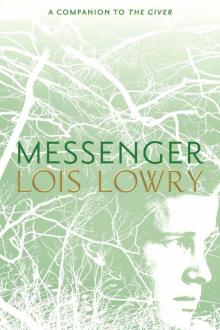 Messenger
Messenger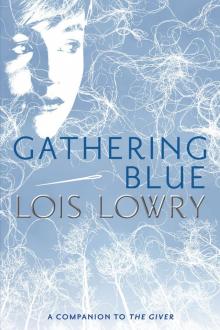 Gathering Blue
Gathering Blue Gooney Bird and All Her Charms
Gooney Bird and All Her Charms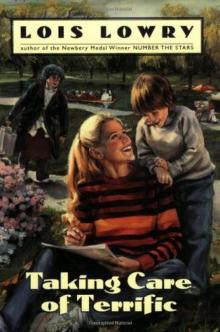 Taking Care of Terrific
Taking Care of Terrific Gooney Bird on the Map
Gooney Bird on the Map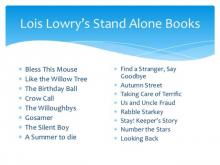 The Birthday Ball
The Birthday Ball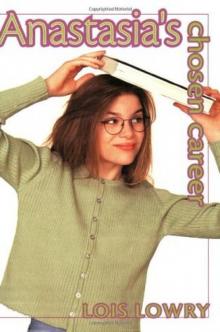 Anastasia's Chosen Career
Anastasia's Chosen Career Number the Stars
Number the Stars The Silent Boy
The Silent Boy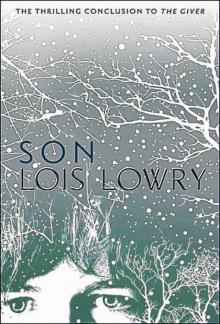 Son
Son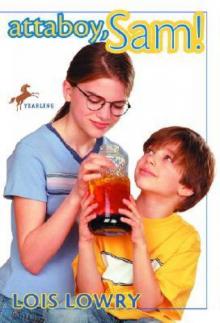 Attaboy, Sam!
Attaboy, Sam! Gooney Bird Greene
Gooney Bird Greene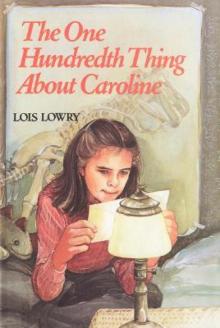 The One Hundredth Thing About Caroline
The One Hundredth Thing About Caroline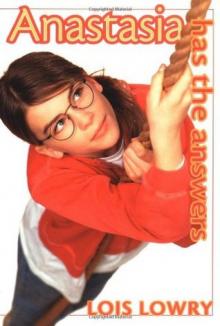 Anastasia Has the Answers
Anastasia Has the Answers Your Move, J. P.!
Your Move, J. P.!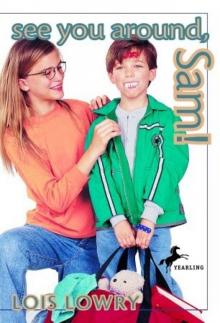 See You Around, Sam!
See You Around, Sam!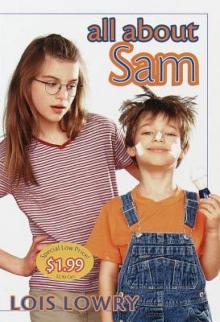 All About Sam
All About Sam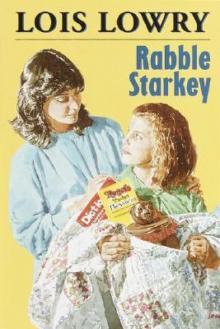 Rabble Starkey
Rabble Starkey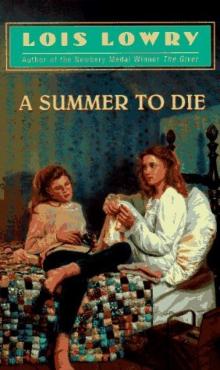 A Summer to Die
A Summer to Die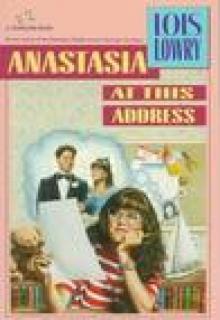 Anastasia at This Address
Anastasia at This Address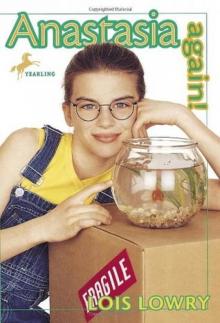 Anastasia Again!
Anastasia Again! Gooney the Fabulous
Gooney the Fabulous Gossamer
Gossamer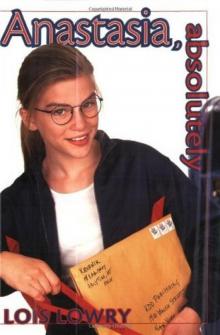 Anastasia, Absolutely
Anastasia, Absolutely Gooney Bird Is So Absurd
Gooney Bird Is So Absurd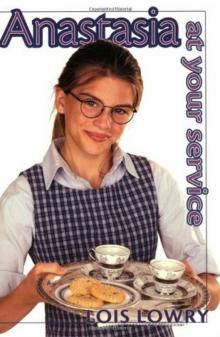 Anastasia at Your Service
Anastasia at Your Service Bless this Mouse
Bless this Mouse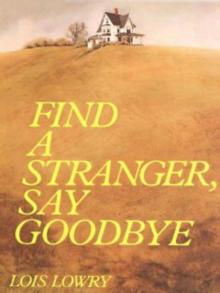 Find a Stranger, Say Goodbye
Find a Stranger, Say Goodbye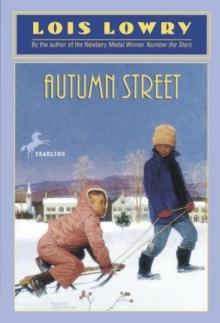 Autumn Street
Autumn Street Stay Keepers Story
Stay Keepers Story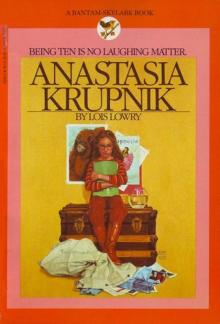 Anastasia Krupnik
Anastasia Krupnik Zooman Sam
Zooman Sam On the Horizon
On the Horizon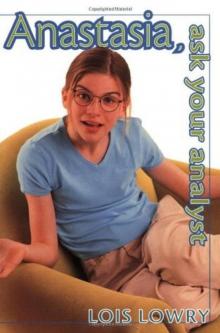 Anastasia, Ask Your Analyst
Anastasia, Ask Your Analyst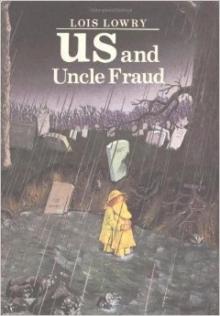 Us and Uncle Fraud
Us and Uncle Fraud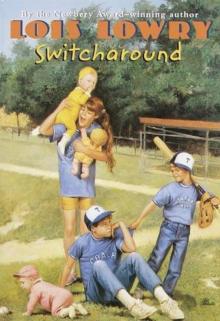 Switcharound
Switcharound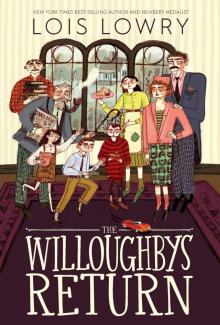 The Willoughbys Return
The Willoughbys Return Dear America: Like the Willow Tree
Dear America: Like the Willow Tree Shining On
Shining On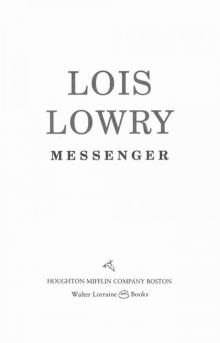 Messenger (The Giver Trilogy)
Messenger (The Giver Trilogy)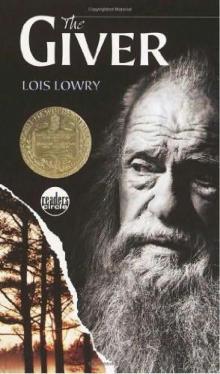 Giver Trilogy 01 - The Giver
Giver Trilogy 01 - The Giver